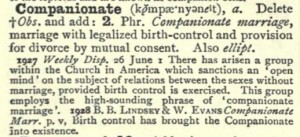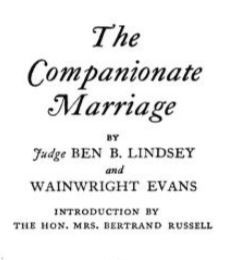Violetta Zein mentions this letter, and the preceding events, at around 1 hour 24 minutes in her excellent youtube video:…
Shoghi Effendi’s term “companionate marriage”
Posted by Sen on January 23, 2024

James Murray, A New English Dictionary on Historical Principles, 1928
In The Advent of Divine Justice, page 30,Shoghi Effendi says “a chaste and holy life … condemns … the practice[] of … companionate marriage.” He does not say that Baha’u’llah condemns it, or the Writings condemn it, so we are not looking for a scriptural text that condemns (in Persian or Arabic) something that corresponds to companionate marriage. The question is what he meant, and what he would expect English-language readers to understand, by “companionate marriage” in English. It’s become a little confusing lately, as new writers are using the phrase to describe a couple who form a household but do not have sexual relations, or no longer have sexual relations.
Shoghi Effendi completed The Advent of Divine Justice on Christmas day, 1938, which was already after the hey-day of the term. The term “companionate marriage” was used by :
– Ben B. Lindsay, in The Revolt of Modern Youth, 1925. That pamphlet set a ball rolling in the USA, but Shoghi Effendi is unlikely to have read it.
– Marcet Haldeman-Julies in “Judge Ben B. Lindsay on Companionate Marriage,” 1927. On page 4 the author says,
“companionate marriage … would be a legal marriage entered into by two people with the deliberate intention of having no children for an indefinite period and in which neither would assume any financial responsibility for the other. But should a child be born, then automatically the marriage would become the family marriage as we have it today, and the husband would be liable for the support of his child and wife according to the laws of the state in which he lived. … Undoubtedly, many of these companionate marriages would be, even without children, changed, by the mutual consent of both the husband and wife, into family marriages. On the other hand, if children did not come and each liked to be economically independent, they might live out their lives together in companionate marriage.

– Ben B. Lindsay and Wainwright Evans, in The Companionate Marriage, 1928. The book has an introduction by Mrs. Bertrand Russell. The preface begins with a definition:
Companionate Marriage is legal marriage, with legalized Birth Control, and with the right to divorce by mutual consent for childless couples, usually without payment of alimony. Companionate Marriage is already an established social fact in this country. It is conventionally respectable. Sophisticated people are, without incurring social reproach, everywhere practicing Birth Control and are also obtaining collusive divorce, outside the law, whenever they want it. They will continue the practice, and no amount of prohibitive legislation can stop them. My thought is that we should put an end to this hypocritical pretense, under which we profess one thing and do another; that the Companionate Marriage, now largely monopolized by educated people who understand scientific contraception, and who can employ skilled lawyers in the obtaining of collusive divorces, ought to be made legally and openly available to all people—particularly to the poor and the socially unfit, who need it most….
– Clement Wood, Why I believe in Trial Marriage, 1929.
– Bertrand Russell in Marriage and Morals, (London, Horace Liveright, 1929). One section recommends childless trial marriage as a means of reducing loose morals among students.
On page 165-6 of Marriage and Morals, Bertrand Russell writes:
For my part, while I am quite convinced that companionate marriage would be a step in the right direction, and would do a great deal of good, I do not think that it goes far enough. I think that all sex relations which do not involve children should be regarded as a purely private affair, and that if a man and a woman choose to live together without having children, that should be no one’s business but their own. I should not hold it desirable that either a man or a woman should enter upon the serious business of a marriage intended to lead to children without having had previous sexual experience. There is a great mass of evidence to show that the first experience of sex should be with a person who has previous knowledge. The sexual act in human beings is not instinctive, and apparently never has been since it ceased to be performed a tergo. And apart from this argument, it seems absurd to ask people to enter upon a relation intended to be lifelong, without any previous knowledge as to their sexual compatibility. It is just as absurd as it would be if a man intending to buy a house were not allowed to view it until he had completed the purchase.
and on page 282:
Stable relations with one partner are difficult for many people until they have had some experience of variety. If our outlook on sex were sane, we should expect university students to be temporarily married, though childless. They would in this way be freed from the obsession of sex which at present greatly interferes with work. They would acquire that experience of the other sex which is desirable as a prelude to the serious partnership of a marriage with children. And they would be free to experience love without the concomitants of subterfuge, concealment, and dread of disease, which at present poison youthful adventures.
There are a few more examples in book formats (I have not checked newspapers), but by 1950 the term had fallen out of use. Bertrand Russell is significant for being English, influential, and having a different nuance. He uses it to mean “marriage for a fixed period” (temporary marriage) in addition to marriage with the option of birth control and divorce, and with financial independence. I suspect that Shoghi Effendi read leaders of thought from the UK, such as Bertrand Russell, more than those in the USA.
Shoghi Effendi might also have made a connection between Russell’s temporary marriage and the Shiah practice of mut`ah marriage, also called sigheh, which is marriage contracted for a fixed term, which serves today as a way of regularizing prostitution and concubinage. But he would not expect his readers to make that connection, so while he was no doubt opposed to mut`ah marriage — and might say so to a Persian audience — I doubt that that is part of his message here.
One of these definitions of companionate marriage, “legal marriage, with legalized Birth Control, and with the right to divorce by mutual consent..” is what we would call a normal heterosexual marriage today. It is no longer necessary to prove — or stage — an act of adultery to obtain a divorce. Contraception has been decriminalized. Wives very often retain control of their earnings and savings. But it seems likely (to me) that it was Bertrand Russell’s more far-reaching proposals that Shoghi Effend thought to be incompatible with a “chaste and holy life.”
Short link for this post: https://wp.me/pcgF5-3t3
meteorquake said
It’s certainly an interesting question.
One thing that comes to mind also is those films about higher society where two people may marry a cold marriage for the sake of appearances, mutual social benefit and dealing with social expectations for which than man gives the woman an allowance but in doing so agree to live entirely disconnected lives where each can have their own partner on the side as their real lover…
Hooshang S. Afshar said
What other things Bahaúllah did not say anything about like world government and future affairs of the world,
but the Guardian wrote a lot about.
Sen said
Hi Hooshang,
Baha’u’llah wrote a lot about world government and the affairs of the world, also its future affairs. So did Abdu’l-Baha. Shoghi Effendi did not just make up his ideas, he drew them from the Bahai writings and his own conversations with Abdu’l-Baha. He recasts the Bahai teachings in a language suited for the people of his day, and he applies them to new situations, such as the public debate about “companionate marriage.” A letter on behalf of Shoghi Effendi states:
Understanding, correlation, and presentation: that’s Shoghi Effendi’s method too. But not invention! If there’s nothing in Baha’u’llah’s writings about a topic, Shoghi Effendi says so.
Hooshang S. Afshar said
Thanks Sen for your reply. I am wondering where I may find in the Writings
references to the world government by Baha’u’llah.
Thanks
Hooshang S. Afshar
Sen said
This is a major theme of Baha’u’llah, which you may find “scattered” throughout his Writings. I do not mean by that, that Baha’u’llah was not a systematic thinker. He was systematic and consistent. He was in correspondence with thousands of people, and wrote hundreds of works intended for larger diverse audience, so — in an age when handwritten letters were the normal means of communication, and printing in Persian and Arabic fonts was not easily available to him — he necessarily repeats himself. So there is a lot of material to read, but a short cut is to begin with Baha’u’llah’s last works, as these are the most general and systematic.
In Epistle to the Son of the Wolf, there is one section beginning at page 30, with “We pray God … that He may graciously assist … the kings of the earth … to establish the Lesser Peace. … It is their duty to convene an all-inclusive assembly, which either they themselves or their ministers will attend, and to enforce whatever measures are required to establish unity and concord amongst men. They must put away the weapons of war, …”
and another section beginning at page 89:
In that work, he also quotes from the surat al-haykal, a major work addressed to the kings and rulers of his day. In that work (The summons of the lord of hosts), there’s one paragraph beginning “O ye the dawning-places of knowledge!..” that is significant for the shape of civil society Baha’u’llah envisions. Then skip forward to the tablet to Pius IX, especially the section starting “O Supreme Pontiff! Incline thine ear…” (Summons , p. 60):
“Abandon thy kingdom unto the kings, … Exhort thou the kings and say: “Deal equitably with men. Beware lest ye transgress the bounds fixed in the Book.” This indeed becometh thee. Beware lest thou appropriate unto thyself the things of the world and the riches thereof.”
and virtually the entire rest of the book is relevant to government and the affairs of the world, sometimes directly and sometimes by implication.
The Lawh-e Maqsud is important. There are comments here about the world events that Baha’u’llah is responding to.
Don’t omit the Lawh-e Dunya, that contains both ethical exhortations regarding the progress of the world, and very concrete advice such as praise of the British constitutional system of government.
Then there’s a great deal in the Aqdas about civil government, from paragraph 78 (O Kings of the Earth…) through to paragraph 93.
… and so on, back through time until you get to Part II of the Iqan.
Hooshang S. Afshar said
Hi Sen
As you say there are a lot regarding government and kings etc. to study. Now I remember I had read some of the above you have mentioned. Thank you very much.